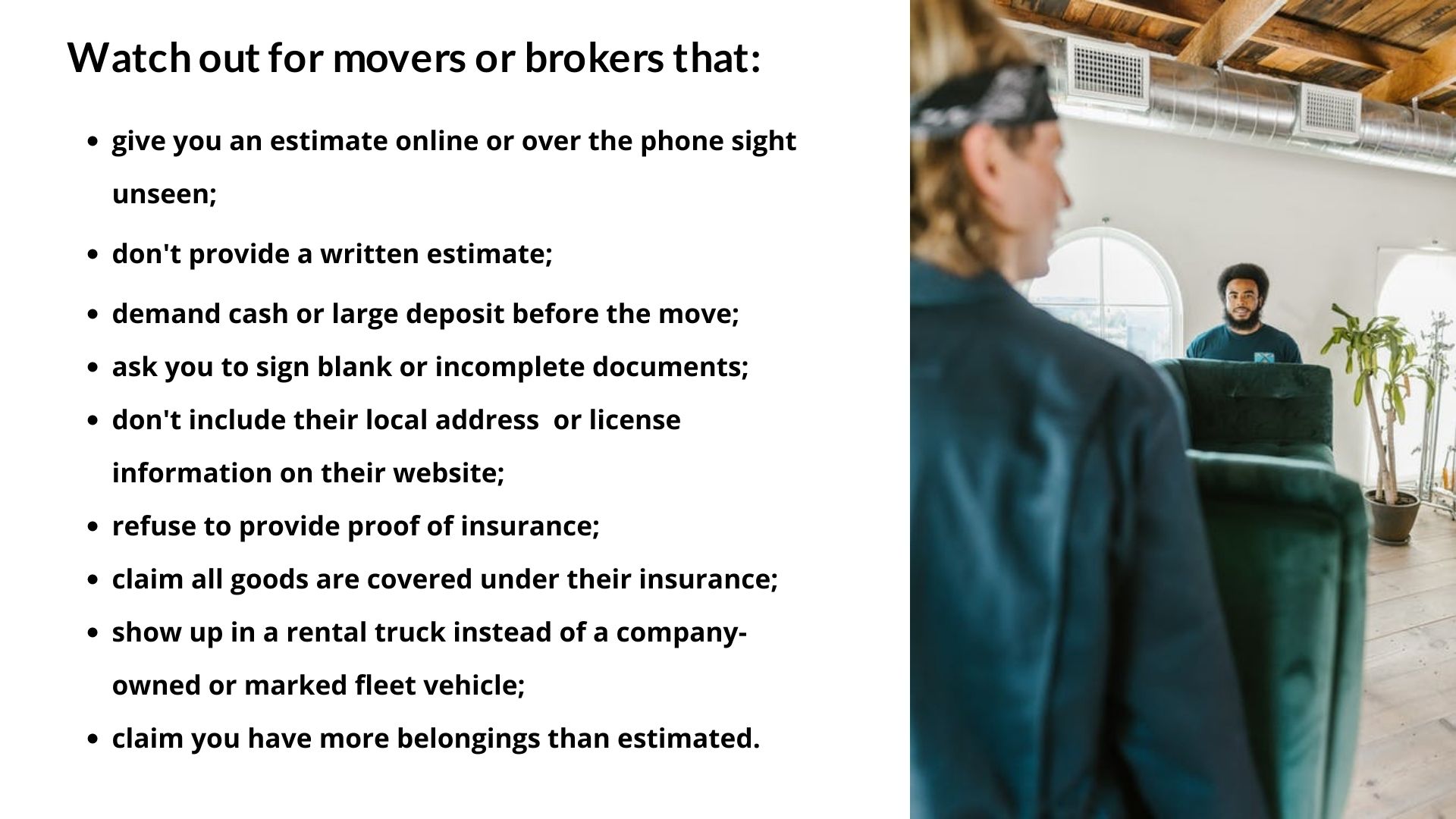
Moving can be an exciting and also stressful event. Choosing a reputable mover or broker is very important because there are scammers ready to take your money, and sometimes your belongings. Knowing what red flags to look out for can help you avoid being defrauded. We’ll discuss how to recognize a moving scam, tips on choosing a mover, and resources to help with your move.
Moving Company Red Flags and Warnings
One of the most common moving schemes are movers or brokers who lowball quotes to get a customer's business and later hold items hostage until the customer pays significantly more than the estimate. Others fraudulently inflate the weight or volume of shipments to charge customers more. Overcharging or using more packing materials and supplies than necessary to increase the final cost is another shady tactic used by scammers. We’ve also seen instances where the bill of lading, the contract for moving, has been altered or falsified to swindle clients. In the display below, we’ve comprised a list of red flags.

Research the Moving Company
You are entrusting the movers with your household goods and should only hire a trustworthy business. Some moving companies are notorious for defrauding customers and closing their doors only to reopen under another name. It’s important for you to check out the business's background and reputation. Anyone looking for a moving company should first check that the business holds the proper license and insurance. For moves within the state, contact your local and state authorities to verify any licensing information. Carriers that move household goods state to state need to be licensed with the Federal Motor Carrier Safety Administration (FMCSA). Visit their website or call the FMCSA at (202) 366-9805 to verify a license and (866) 637-0635 for insurance information.
Once you’ve confirmed the business is licensed, look them up in Business Consumer Alliance’s directory. Search online for reviews, complaints, and information about the company. Use the company’s name and the words “scam” or “complaints” to see what results are returned. Make sure to check out each business, even those that are recommended to you by others.
Get Written Estimates
After you’ve narrowed down a list of eligible movers, request that a company representative come out to do a visual inspection. Don’t accept an estimate over the phone or sent online if the business has not done a visual inspection of the items being moved. Instead, obtain a written estimate from several movers to do a price and services comparison.
There are two types of estimates: binding and non-binding. This determines how the moving charges are calculated. Binding estimates mean the price quoted is what you pay even if unforeseen costs arise. A non-binding estimate typically means that the price quoted will not be the same as the final moving costs. The estimate is typically based on time, number of movers needed, packing services, and the number of rooms to be moved. The estimate will also notify the customer of the liability coverage options:
- Full (Replacement) Value Protection and
- Waiver of Full (Replacement) Value Protection (60 cents per pound).
Never sign a blank or incomplete estimate. The estimate should be dated and signed by both mover and client. [1] The client and mover may agree to change an estimate of charges based on changed circumstances, but only before the items are loaded.
Responsibilities of the Mover/Broker
Movers or brokers must provide the following information before a move:
Movers are required to prepare an “Order for Service” for the shipment that includes the mover’s name, address, and license number; the client’s name, addresses, and contact information; the name and contact information of the delivering mover’s office or agent nearest to the destination point; either the agreed-upon pickup date and delivery date of the move, the agreed-upon period(s) of the entire move, or the guaranteed dates or periods of time for pickup, transportation, and delivery if the mover is transporting the shipment on a guaranteed service basis; payment information, including the total charges, form of payment accepted, and payment terms; a complete description of any special or accessorial services ordered and minimum weight or volume charges applicable to the shipment. A full list of items that must be included can be found in the booklet linked above. You should promptly cancel the order if there is a delay or the move needs to be cancelled. After three days the mover can charge a penalty.
Another document required is the “Bill of Lading”, the contract between you and the mover to transport the shipment. The information on a bill of lading is required to be the same information shown on the order for service. The driver must provide you with a copy before or at the time the shipment is loaded. You should keep this contract available until the move is complete and payment is made. You are responsible for reading the bill of lading before accepting it, so make sure you take time to review it thoroughly.
An inventory list must be provided to you after the goods are loaded. This is the receipt showing each item that is shipped and its condition. Go over the list to make sure all items being moved are listed properly.
The Customer’s Responsibilities
It‘s your responsibility to read all moving documents issued by the mover. You must be available, or appoint a responsible representative, to be present when the shipment is picked up and delivered. You or your representative should supervise the move. Watch the loading and unloading process. If anything changes regarding the move, such as the moving date, additional items added, or additional services needed, contact the mover promptly. Payments should be made on time and in the form agreed upon with the mover. If there are any issues with loss, damages, or delays with the shipment, file a claim right away.

Handling Issues with Your Move
Discuss any issues regarding the move with the company or its agent first. If an agreement cannot be reached, you can file a complaint with BCA for mediation. If the mover was paid by credit card, contact the credit card company or financial institution to file a dispute. If the moving company holds your items hostage, federal law has consumer protections in place that state movers cannot demand payment greater than 110 of the cost of the original written estimate before they deliver the goods.
Complaints can also be filed the FMCSA for interstate moves or your local state law enforcement. American Trucking Association also accepts moving complaints.
For a list of moving and storage companies in your state, visit BCA’s directory. Stay updated with consumer tips, scam warnings, and much more by following BCA on Facebook.
[1] For moves within a 50-mile radius of your mover’s (or its agent’s or broker’s) place of business, the estimate must be based on a physical survey of your household goods, unless you waive this requirement in writing before your shipment is loaded.